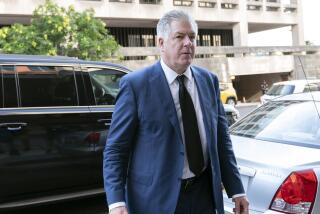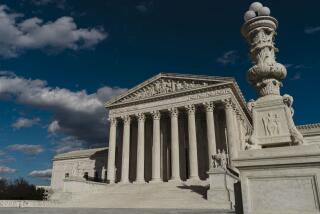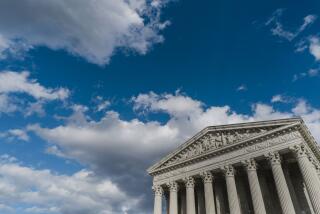Miranda rights threatened
- Share via
Atty. Gen. Eric H. Holder Jr. and the White House are floating the idea of legislation that would create a new exception to the Miranda rule for suspected terrorists. It’s not as outrageous as Sen. Joe Lieberman’s proposal that accused terrorists be stripped of their U.S. citizenship, but it’s still a bad idea.
In a television interview this week, Holder said only that he wanted to work with Congress on legislation to provide investigators with “necessary flexibility.” White House Press Secretary Robert Gibbs was equally general in his comments, and the administration hasn’t offered a detailed proposal. Still, Holder said the administration’s interest in legislation was “big news.” It’s also bad news that will embolden members of Congress who object not only to reading terrorist suspects their rights but also to the practice of trying terrorists, including U.S. citizens, in civilian courts.
Current law provides the FBI with adequate flexibility in questioning suspects who may have knowledge of a continuing or imminent threat. Under a 1984 Supreme Court decision, self-incriminatory statements can be admitted at trial — even if a suspect wasn’t advised of his right to remain silent and his right to a lawyer — if police asked questions “reasonably prompted by a concern for public safety.”
If anything, this language is too broad. But it certainly justifies the decision by investigators to delay providing Miranda warnings to Faisal Shahzad, the U.S. citizen accused in the failed Times Square bombing, and Umar Farouk Abdulmutallab, the Nigerian who allegedly tried to detonate a bomb on an airliner on Christmas Day. Shahzad continued to answer questions after being read his rights; Abdulmutallab was Mirandized only after he stopped talking, according to government sources, but resumed cooperating after meeting with his family.
Although there is no guarantee that other suspects would be similarly cooperative, the existing public safety exception allows investigators sufficient flexibility to question suspects for a considerable period of time without jeopardizing a criminal case. Two other facts are worth remembering: The Miranda rule is primarily concerned with what evidence may be introduced at trial; it doesn’t prevent investigators from violating the rule in an extreme “ticking time bomb” scenario. And suspects may choose to remain silent even if they aren’t read their rights.
If the public safety exception needs to be clarified, that decision should be left to the institution that gave us Miranda in the first place: the Supreme Court.
More to Read
Get the L.A. Times Politics newsletter
Deeply reported insights into legislation, politics and policy from Sacramento, Washington and beyond. In your inbox twice per week.
You may occasionally receive promotional content from the Los Angeles Times.










